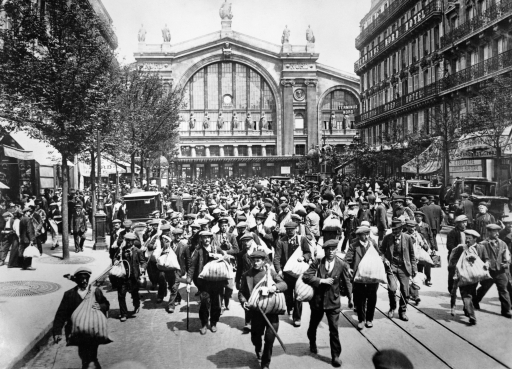Today marks exactly one year before the 100th anniversary of the German declaration of war on France.
Belgium rejects German ultimatum
Germany had issued Belgium with an ultimatum on the 2nd August 1914 which demanded Germany be allowed to occupy Belgium in anticipation of a French attack.
The ultimatum was rejected by the Belgian Government on the 3rd August, stating that: “The Belgian Government, if they were to accept the proposals submitted to them, would sacrifice the honour of the nation and betray their duty towards Europe”.
Germany declares war on France
Germany declared war on France, citing “acts of aggression”, which allegedly included the attempted destruction of German buildings by French forces through aerial bombing.
French Centenary plans
Plans to mark the Centenary of the First World War in France have been gaining momentum at regional, national and international levels.
The French Government launched Mission Centenaire 14-18 in 2012. It is responsible for developing, supporting and publicising France’s Centenary commemorations programme over the four year period.
Regional museums are also developing plans to mark the Centenary of the conflict, with the Museum of the Great War of the Pays de Meaux expected to be a leading institution in France’s efforts to mark the conflict.
Due to the amount of battles that took place on French soil, international plans to commemorate the conflict feature in France’s commemorations, with many countries choosing to send dignitaries to France or to restore memorials in the country.
Australia announced in July 2013 that it would be contributing $700,000 towards the renovation of Franco Australian Museum in Villers-Bretonneux for the Centenary.
Canada announced that it will spend $5 million on a permanent visitor centre at the Canadian National Vimy Ridge Memorial in France, to commemorate the Centenary of the battle in 2017.
The international element of France’s Centenary commemorations is wide in scope, with a “Letter of Intent” having been signed with Britain in July 2013 to co-operate during the Centenary period.
France has also provided funding to the city of Sarajevo, in order to mark the Centenary of the assassination of Archduke Franz Ferdinand and the outbreak of the conflict.
It has also been reported the Tour de France will plot a special Centenary route in 2014 – including along battlefronts – to mark the 100 year anniversary of the conflict.
There has been a debate in France about how much focus is being placed on the Centenary of the First World War.
The year 2014 marks not only the 100 year anniversary of the First World War for France, but 70 years of liberation from Nazi rule in 1944.
As a result, Centenary commemorations may be integrated with, or overlap with, events taking place to mark the celebration of France’s liberation.
German Centenary plans
German plans to mark the 100 year anniversary of the conflict at a national level have not yet emerged.
However, Germany will provide funding towards events in Sarajevo to mark the Centenary.
Plans at regional level – particularly amongst museums – to mark the conflict are beginning to take shape, and more news is expected from them in the coming year.
Representatives of the German Government are expected to mark dates of international significance, particularly on the Western Front, alongside Belgian, British and French dignitaries.
The will to commemorate the conflict in Germany – both at public and political levels – may be a factor affecting German Centenary plans.
The end of the First World War brought political and economic instability to Germany and is often viewed as central to the rise of Nazism in the country, and therefore sits uncomfortably in the nation’s history.
Coupled with the fact that – in general – the Second World War overshadows the First in Germany, the Centenary may not be marked in the same way in Germany as it is elsewhere.
At a conference held at the National World War I Museum in Kansas City in March 2013 entitled A Century in the Shadow of the First World War, Dr. Reiner Pommerin of the Militärgeschichtliche Zeitschrift told the conference that “nothing is going on” in Germany to mark the Centenary.
Furthermore, Germany may choose to mark the end of the conflict: the sailors’ mutiny at Kiel in 1918; the German Revolution; and the Armistice for many Germans had a greater bearing on Germany’s history than the conflict itself.
Further Centenary plans from France and Germany at regional, national and international levels are expected in the coming year.
Posted by: Daniel Barry, Centenary News
